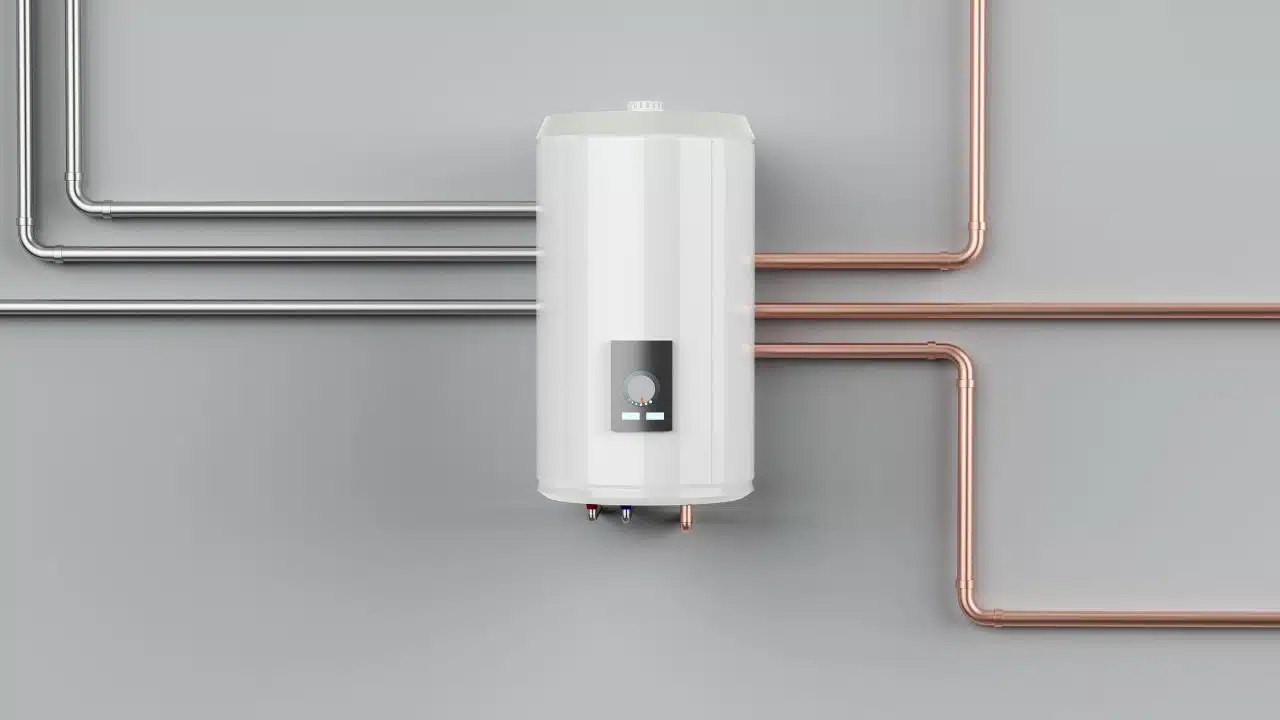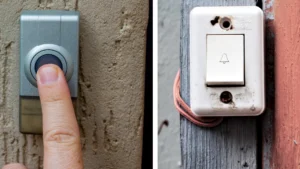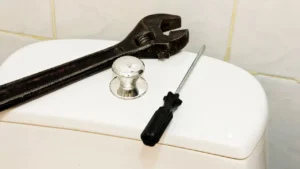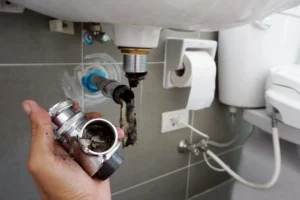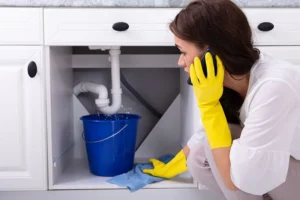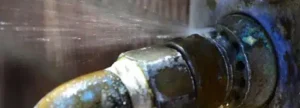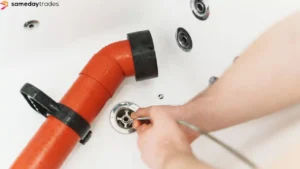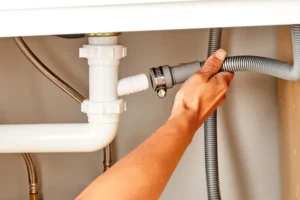Is your water heater gas or electric? Many people struggle to figure this out, especially when faced with leaks or no hot water. This guide will help you identify your system and learn how it works.
Identifying Your Water Heater Type
Figuring out your water heater’s energy source can save you time and money. A quick look at key parts, like the power supply or pilot light, will give you clues.
Signs of a Gas Water Heater
Gas water heaters are common in many Australian homes. They use gas, such as natural gas or LPG, to heat water efficiently.
- A pilot light is visible. Gas hot water heaters often have a small flame that stays lit to ignite the burner when required.
- You hear a whooshing sound when it activates. This noise occurs as gas ignites inside the unit.
- There’s a vent pipe sticking out on top. Gas systems typically need ventilation to release carbon monoxide and other emissions.
- It keeps working during power outages. Since most don’t depend entirely on electricity, they can still heat your water during blackouts.
- A gas meter near the unit might be present. This measures how much gas flows into your house for various appliances, including the heater.
- The thermostat settings could feel warm nearby. Gas burners produce more direct heat, warming their surroundings faster than electric ones.
- Look for notices about indoor air pollution risks around its label area or manual if available nearby.
- You pay separate gas bills beyond just electricity expenses monthly—these can often be higher in winter due to more frequent hot showers and baths!
- The tank heats quickly but may run out faster than some electric storage models during heavy use throughout busy mornings alongside family dishwasher cycles.
- No significant electrical connections are seen besides possibly small ignition sparking technology incorporated over recent decades, reflecting advancements in modern living with safer, more efficient home essentials. These systems offer durable and user-friendly solutions, drawing from older, reliable methods while aligning with contemporary lifestyle needs. They contribute to sustainability and improved quality of life, supported by professional and dependable plumbers enhancing household comfort and convenience.
Signs of an Electric Water Heater
Electric water heaters are common in many homes. They usually have distinct features that make them easy to identify.
- No Gas Line
If there’s no gas line or LPG cylinder near your unit, it’s likely electric. These heaters don’t need a gas connection to work. - Powered by Electricity
You’ll see an electrical cord plugged into a power supply or breaker. This provides the current needed for heating the water. - Quiet Operation
Electric systems are quiet compared to gas heaters, which can produce clicks or noises from the pilot flame or ignition. - Thermostat Settings
Many electric models come with visible temperature dials on their panels. These allow you to adjust the thermostat directly. - Absence of a Pilot Flame
Electric heaters don’t use a pilot flame for heat generation. Instead, they rely on heating elements powered by electricity. - Heating Elements Inside Tank
Electric storage tanks have internal heating coils that warm the water inside without external flames. - Higher Energy Bills Without Solar Power
If solar panels or renewable energy aren’t used, electricity costs may reflect higher usage due to heating demands. - Heat Pump Components (for some models)
Some modern electric systems like heat pump water heaters include outdoor fans and compressors for extra efficiency. - No Exhaust Ventilation Needed
Electric units don’t emit particulates like gas ones, so there’s no need for flue pipes or vents near the system. - Location Flexibility
Since they lack exhaust requirements, these can be installed almost anywhere inside a property—basement, laundry room, etc.
How Gas Water Heaters Work
Gas water heaters use natural gas or propane to heat water. They rely on burners, valves, and heat exchangers to warm the tank or flow of water quickly.
Traditional Gas Water Heaters
Traditional units rely on a gas burner at the bottom of the tank. They heat water stored in a tank, using natural gas or propane. A pilot light keeps burning to ignite the main burner when needed.
This steady flame ensures hot water is always ready.
These heaters include a valve to control temperature and pressure for safety. Over time, parts like the sacrificial anode inside may corrode, protecting the tank from rusting out early.
Regular maintenance can help with energy savings and efficiency over years of use.
Modern Gas Water Heaters with Electric Ignition
Modern gas water heaters have stepped up their game. They now use electric ignition instead of a standing pilot light. This makes them more energy-efficient and safer to operate. Electric ignitions spark only when heating is needed, unlike the older systems that burn fuel continuously.
These water heaters need electricity to ignite the flame. A power outage might cause issues unless there’s backup power like a generator or battery system in place. Some models also include advanced features like temperature control and energy-saving modes, adding convenience while cutting electricity prices over time.
How Electric Water Heaters Work
Electric water heaters use electrical current to warm the water. They are simple, reliable, and don’t rely on fossil fuels like gas systems do.
Tank vs. Tankless Electric Systems
Tank systems store hot water in a large cylinder. They heat it throughout the day, even when not in use. These systems are great for big families but can waste electricity due to constant heat retention needs.
Over time, tanks may corrode and require regular maintenance.
Tankless water heaters don’t store water; they heat it as needed. This lowers electricity usage and saves space in your home. They’re ideal for smaller households or those with limited plumbing setups but might struggle with high-demand showers or multiple faucet uses at once!
Heat Pump Water Heaters
Heat pump water heaters pull warmth from the air to heat water. They work like a reverse air conditioner, using less electricity than standard electric systems. This makes them great for cutting power bills and greenhouse emissions.
They run best in warm areas since they rely on surrounding heat. Solar electricity can also pair well with these systems for even lower costs. Perfect for families watching their energy use or aiming for green power solutions!
Conclusion
Figuring out if your water heater runs on gas or electricity isn’t too hard. Check for clues like a pilot light, a gas line, or an electrical cord. Each type has its perks and quirks, so knowing what you have matters.
Whether it’s gas storage or electric heat pumps, understanding your system helps save money and energy. Plus, switching to solar hot water systems could be worth considering down the track!
FAQs
How can I tell if my water heater uses gas or electricity?
Check for a gas line, LPG cylinders, or a pilot light near your hot water system. If you see none of these, it may be electric and powered through the electricity supply.
What’s the difference between gas and electric hot water systems?
Gas hot water systems often use burners or boilers to heat water quickly, while electric ones rely on heating elements or an electric heat pump connected to your power supply.
Can solar hot water systems work with both gas and electricity?
Yes, solar hot water systems can pair with either gas storage units or electric backups like battery backup options for when there's not enough sunlight.
Why does my heater have parts like a thermopile or thermocouple?
These components are common in some gas-powered heaters. They help control safety features by managing how the burner operates.
Are there renewable options for heating my water?
Solar PV panels combined with a solar hot water system offer clean energy from renewable sources, reducing reliance on non-renewable resources like natural gas.
Can hard water damage my heater over time?
Yes, minerals in hard water can corrode parts of both types of heaters—whether it's an electric element or the inside of a furnace in a boiler-based system—leading to reduced efficiency over time.

